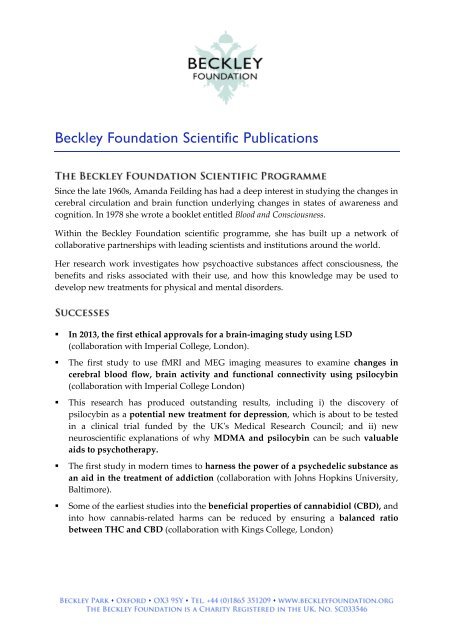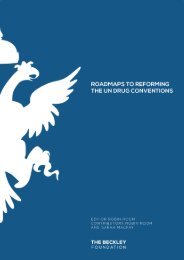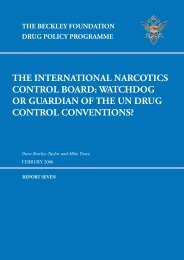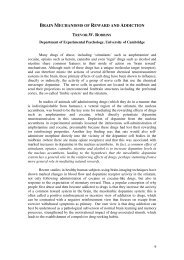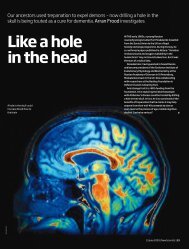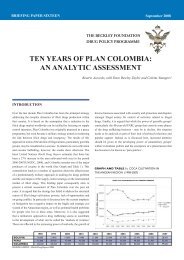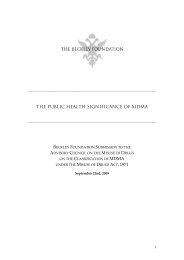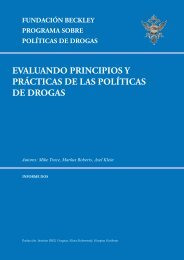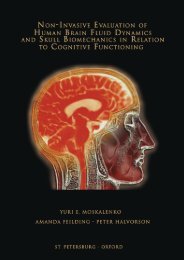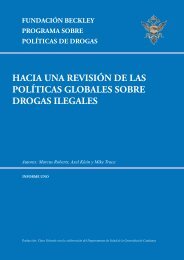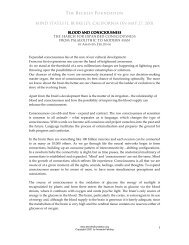Scientific Programme Publications - Beckley Foundation
Scientific Programme Publications - Beckley Foundation
Scientific Programme Publications - Beckley Foundation
You also want an ePaper? Increase the reach of your titles
YUMPU automatically turns print PDFs into web optimized ePapers that Google loves.
<strong>Beckley</strong> <strong>Foundation</strong> <strong>Scientific</strong> <strong>Publications</strong><br />
Since the late 1960s, Amanda Feilding has had a deep interest in studying the changes in<br />
cerebral circulation and brain function underlying changes in states of awareness and<br />
cognition. In 1978 she wrote a booklet entitled Blood and Consciousness.<br />
Within the <strong>Beckley</strong> <strong>Foundation</strong> scientific programme, she has built up a network of<br />
collaborative partnerships with leading scientists and institutions around the world.<br />
Her research work investigates how psychoactive substances affect consciousness, the<br />
benefits and risks associated with their use, and how this knowledge may be used to<br />
develop new treatments for physical and mental disorders.<br />
In 2013, the first ethical approvals for a brain-imaging study using LSD<br />
(collaboration with Imperial College, London).<br />
The first study to use fMRI and MEG imaging measures to examine changes in<br />
cerebral blood flow, brain activity and functional connectivity using psilocybin<br />
(collaboration with Imperial College London)<br />
This research has produced outstanding results, including i) the discovery of<br />
psilocybin as a potential new treatment for depression, which is about to be tested<br />
in a clinical trial funded by the UK's Medical Research Council; and ii) new<br />
neuroscientific explanations of why MDMA and psilocybin can be such valuable<br />
aids to psychotherapy.<br />
The first study in modern times to harness the power of a psychedelic substance as<br />
an aid in the treatment of addiction (collaboration with Johns Hopkins University,<br />
Baltimore).<br />
Some of the earliest studies into the beneficial properties of cannabidiol (CBD), and<br />
into how cannabis-related harms can be reduced by ensuring a balanced ratio<br />
between THC and CBD (collaboration with Kings College, London)
Amanda Feilding’s <strong>Scientific</strong> Papers and <strong>Publications</strong><br />
<strong>Beckley</strong> <strong>Foundation</strong>/Imperial College Psychopharmacological <strong>Programme</strong>:<br />
Amanda Feilding’s collaboration with Prof Dave Nutt and Dr Robin Carhart-Harris<br />
Published papers<br />
Functional connectivity measures after psilocybin inform a novel hypothesis of<br />
early psychosis<br />
Carhart-Harris RL, Feilding A, Nutt DJ et al., Schizophrenia Bulletin, 27 October 2012 epub<br />
Neural correlates of the psychedelic state as determined by fMRI studies with<br />
psilocybin<br />
Carhart-Harris RL, Feilding A, Nutt DJ et al., Proceedings of the National Academy of<br />
Sciences of the USA , 2012, 109(6) 2138–43.<br />
Implications for psychedelic-assisted psychotherapy: functional magnetic<br />
resonance imaging study with psilocybin<br />
Carhart-Harris RL, Feilding A, Nutt DJ et al., British Journal of Psychiatry, 2012,<br />
200(3):238–44.<br />
The administration of psilocybin to healthy hallucinogen-experienced volunteers<br />
in a mock-fMRI environment: a preliminary investigation of tolerability<br />
Carhart-Harris RL, Feilding A, Nutt DJ et al., Journal of Psychopharmacology, 2011,<br />
25(11):1562–67<br />
Writing/Submitted<br />
Resting-state hippocampal functional connectivity after psilocybin<br />
Carhart-Harris RL, Feilding A, Nutt DJ et al.<br />
The mind revealing itself to itself: A causal role for deep layer pyramidal cells in<br />
the human psychedelic state<br />
Muthukumaraswamy SD, Carhart-Harris RL, Feilding A, Nutt DJ et al.<br />
The effects of psilocybin on effective connectivity in the Default Mode Network<br />
during resting state<br />
Kaelen M, Carhart-Harris RL, Feilding A, Nutt DJ et al.<br />
The effect of MDMA on recollecting emotionally-potent autobiographical<br />
memories: an fMRI study with implications for MDMA-assisted psychotherapy<br />
Carhart-Harris RL, Feilding A, Curran VH, Nutt DJ et al.<br />
– 2 –
<strong>Beckley</strong> <strong>Foundation</strong> Collaboration with University College London:<br />
Prof Val Curran and Dr Celia Morgan<br />
Harms and benefits associated with psychoactive drugs: findings of an<br />
international survey of active drug users<br />
Morgan CJA, Feilding A, Curran VH et al., Journal of Psychopharmacology, 25 Feb 2013<br />
epub<br />
Investigating the interaction between schizotypy, divergent thinking and<br />
cannabis use<br />
Schafer G, Feilding A, Morgan CJA et al., Consciousness and Cognition, 2012, 21:292–98.<br />
Cognitive and subjective effects of mephedrone and factors influencing use of a<br />
new ‘legal high’<br />
Freeman, TP, Morgan, CJA, Vaughn-Jones et al., Addiction, 2012, 107:792–800.<br />
(<strong>Beckley</strong> <strong>Foundation</strong>-sponsored study)<br />
<strong>Beckley</strong> <strong>Foundation</strong> Collaboration with King’s College, Institute of Psychiatry:<br />
Dr Paul Morrison<br />
Cannabidiol inhibits THC-elicited psychosis and hippocampal-dependent<br />
memory impairment<br />
Englund A, Morrison P, Feilding A et al., Journal of Psychopharmacology, 2013<br />
Jan;27(1):19–27<br />
Communication breakdown: delta-9-tetrahydrocannabinol effects on pre-speech<br />
neural coherence<br />
Stone J, Morrison P, Feilding A et al., Molecular Psychiatry, 2012 Jun;17(6):568–9.<br />
Delta-9-tetrahydrocannabinol disruption of time perception and of self-timed<br />
actions<br />
Stone JM, Morrison PD, Feilding A et al., Pharmacopsychiatry, 2010 Aug, 43(6):236–7.<br />
Does intravenous (D)9-tetrahydrocannabinol increase dopamine release? A SPET<br />
study<br />
Barkus E, Morrison PD, Vuletic D et al., Journal of Psychopharmacology, 2011, 25(11):1462–8.<br />
(<strong>Beckley</strong> <strong>Foundation</strong>-sponsored study)<br />
Disruption of Frontal Theta Coherence by Δ(9)-Tetrahydrocannabinol is<br />
Associated with Positive Psychotic Symptoms<br />
Morrison PD, Nottage J, Stone JM et al., Neuropsychopharmacology, 2011, 36(4):827–36.<br />
(<strong>Beckley</strong> <strong>Foundation</strong>-sponsored study)<br />
– 3 –
Opposite effects of delta-9-tetrahydrocannabinol and cannabidiol on human brain<br />
function and psychopathology<br />
Bhattacharyya S, Morrison PD, Fusar-Poli P, et al., Neuropsychopharmacology, 2010,<br />
35(3):764–74.<br />
(<strong>Beckley</strong> <strong>Foundation</strong>-sponsored study)<br />
<strong>Beckley</strong> <strong>Foundation</strong> Collaboration with Sechenov Institute of Evolutionary<br />
Physiology and Biochemistry, Russian Academy of Sciences:<br />
Amanda Feilding in collaboration with Prof Yuri Moskalenko<br />
Professor Yuri Moskalenko is an internationally recognised expert in the field of cerebral<br />
circulation and has written several much-cited books on the subject. This is a selection of<br />
publications from their collaboration:<br />
Non-Invasive Evaluation of Human Brain Fluid Dynamics and Skull<br />
Biomechanics in Relation to Cognitive Functioning<br />
Moskalenko Y, Feilding A and Halvorson P. Monograph. Published by <strong>Beckley</strong><br />
<strong>Foundation</strong> Press (2009)<br />
Effects of cranial trepanation on the functioning of cerebrovascular and<br />
cerebrospinal fluid systems<br />
Moskalenko Y, Feilding A, et al., International Journal of Psychophysiology, 2008, 69(3):302.<br />
Relation of age cognitive disorders with cranial compliance, cerebrospinal fluid<br />
mobility and cerebral circulation<br />
Moskalenko Y Feilding A et al., International Journal of Pathophysiology, 2008, 69(3):307.<br />
The effect of craniotomy on the intracranial hemodynamics and cerebrospinal<br />
fluid dynamics in humans<br />
Moskalenko YE, Feilding A et al. Human Physiology, 2008, 34(3):299–305.<br />
Biomechanical properties of human cranium: aging aspects<br />
Moskalenko YE, Feilding A et al. Journal of Evolutionary Biochemistry and Physiology, 2008,<br />
44(5):605–14.<br />
Effect of the skull trephination opening on the interaction between intracranial,<br />
vascular and CSF systems<br />
Moskalenko, Y, Feilding A et al., 2006, Journal of Neurotrauma 23(6):1000.<br />
Slow-wave oscillations in the craniosacral space: a hemo- liquorodynamic concept<br />
of origination<br />
Moskalenko YE, Feilding A et al. Neuroscience and Behavioral Physiology, 2009, 39(4):377–<br />
81.<br />
– 4 –
Noninvasive dynamic evaluation of functioning in the intracranial system<br />
Moskalenko YE, Feilding A et al., Proceedings of the 4th International Conference<br />
“Development and applying of high technologies in science, industry and education”, St<br />
Petersburg, 2007, vol. 10:214–15.<br />
Age-dependent correlation between cerebral blood circulation, cerebrospinal fluid<br />
dynamics and the cranial compliance<br />
Moskalenko YE, Feilding A et al. Proceedings of the 6th European Congress of the<br />
International Association of Gerontology and Geriatrics, “Healthy Aging for All<br />
Europeans”, St Petersburg, 2007, Advances in Gerontology 20(3):58.<br />
<strong>Beckley</strong> <strong>Foundation</strong> Collaboration with Freiburg University:<br />
Prof Thilo Hinterberger<br />
Neurophysiological correlates to psychological trait variables in experienced<br />
meditative practitioners<br />
Thilo Hinterberger, Amanda Feilding et al., In Neuroscience, Consciousness and Spirituality,<br />
H. Walach, S. Schmidt & W. Jonas (eds), Berlin: Springer (2011), pp. 12957.<br />
<strong>Beckley</strong> <strong>Foundation</strong> Collaboration with Medizinische Hochschule, Hanover:<br />
Prof Torsten Passie<br />
Cluster headache attack cessation and remission extension of months or longer in<br />
six treatment-refractory patients administered only three doses of BOL-148<br />
Karst M, Passie T. Poster presented at the 15th International Headache Congress, Berlin, 2011.<br />
<strong>Beckley</strong> <strong>Foundation</strong> Collaboration with University of California at Berkeley:<br />
Dr Matthew Baggott<br />
Protocol for LSD research; first ethical approvals obtained in 2007.<br />
Further collaborative work on MDMA, MDA and oxytocin.<br />
Dr Robin Carhart-Harris, Imperial College London<br />
Mendel Kaelen, Imperial College London<br />
– 5 –


